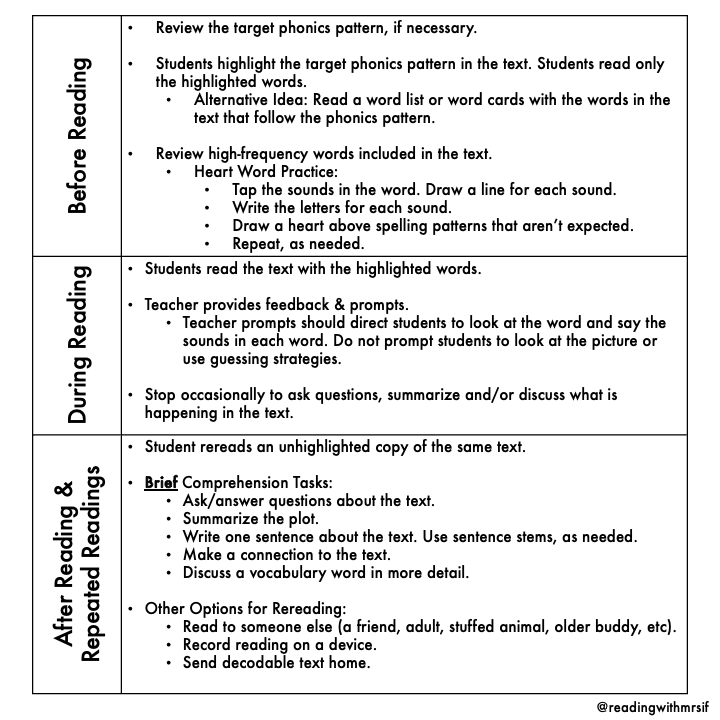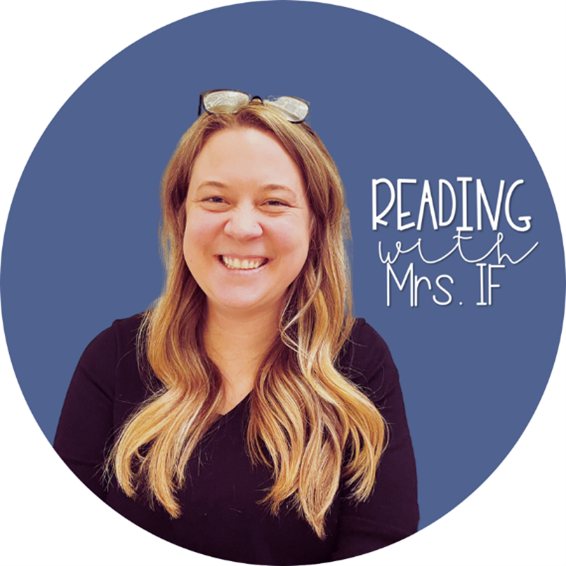

BLOGS > JANUARY 20, 2025
BY HANNAH IRION-FRAKE, K-5 LITERACY COACH

As a former classroom teacher, there are few things as near and dear to my heart as my collection of books. I’d be willing to bet that I’m not alone in that sentiment. But as important as it is to have books in an elementary classroom, it’s equally important to understand where those books fit into instruction in an elementary curriculum. This includes knowing the what, why, and how for authentic texts, hi/lo readers, graphic novels, and decodable text.
Rest assured that all of these types of texts have a place in an elementary classroom. But knowing when to use them falls on the expertise of the teacher.
Decodable texts are an instructional tool that belong in a strong phonics curriculum. Because of this, we often see them in kindergarten, first grade, and second grade classrooms, as well as in reading intervention settings. Decodable texts enable our beginning readers to practice their new decoding skills in an authentic but supportive format, helping them build automaticity with their new phonics skills. But there’s an end to using decodable text. Or, one could argue that all texts become decodable texts once students have become fluent readers!
Once students have the decoding skills to read authentic texts, they should! You can start them off with easier authentic texts, like hi/lo books and graphic novels. Students with the decoding skills to read authentic texts will benefit from ample opportunities to read. This will increase their vocabulary acquisition, build their background knowledge, expose them to more advanced syntax, and support their pattern-learning brain!
But don’t wait until students can read authentic texts to expose them to authentic text. As students are doing the hard work of learning how to read, they should also have opportunities to listen to great authentic texts in the classroom. This will help them practice their listening comprehension and build their oral language capabilities. Read-alouds are a key component in all elementary classrooms, regardless of what kind of texts students are reading on their own.
The way you use a decodable text is different than how you would use authentic text. When using decoding texts, your goal is accurate word reading. You want students to use their sound-symbol knowledge to build strong orthographic knowledge of words. With authentic texts, your goal is comprehension. You want students to develop a deep understanding of the content they’re reading. These different purposes require different approaches for using texts.
To help support word reading, a decodable text routine can be a useful tool for elementary teachers. There are intentional instructional moves you can use before, during, and after reading decodable text. Teachers should explicitly teach the target phonics patterns and then provide lots of opportunities to read and write with that pattern. The image below outlines a strong decodable text routine.

Instruction for comprehension is a more complex topic. Our goal as educators should be to create the conditions for comprehension to occur. To do this, there are also things we can do before, during, and after reading.
I’ll be sharing more about these different types of texts during my webinar, Different Types of Text: The What, Why, and How for Elementary Classrooms, on January 21 at 4pm CT. I hope to see you there! (Hint: you may also use the same link to watch the recording if you missed the live webinar!)
ABOUT THE AUTHOR:

Hannah Irion-Frake is a literacy coach in Central Pennsylvania with over 16 years of classroom experience. She has degrees in Elementary Education, Reading, and Curriculum & Instruction. Hannah is also a Local LETRS Facilitator. She’s a self-proclaimed literacy nerd. Hannah shares passionately about reading at www.readingwithmrsif.com and on Instagram @readingwithmrsif.
Grow confident and capable readers with Follett Content!
Follett can help you motivate and engage striving readers, including reluctant readers and English learners.
Learn more about resources for striving readers.
Are you looking to support striving readers in your school or library? Get a free consultation on how you can support striving readers in your school!
An Author Interview with Don Everts
December 17, 2025
What peculiar thread connects secret superpowers, chicken farming, Victorian architecture, and the impossible awkwardness of being 14? Debut middle grade author Don Everts weaves it together for us in this conversation about his new book, Oscar and the Mystery of...
Read more
An Author Interview with Sara Amini and Illustrator Shadia Amin
December 17, 2025
Author Sara Amini and artist Shadia Amin team up for this charming, semi-autobiographical middle grade graphic memoir that explores evolving friendships, puberty mishaps, and finding a place to belong. Navigating life as a multiracial girl has never been more hilarious...
Read more
An Author Interview with Katherine Applegate
December 17, 2025
Go behind the scenes with Newbery Medal-winning author and literary superstar Katherine Applegate as she discusses her returns with two exciting new titles releasing in spring! First up is The Littlest Elephant, a picture book adaptation of the best-selling middle grade...
Read more
An Author Interview with Amy Timberlake and Illustrator Jon Klassen
December 17, 2025
Award-winning author Amy Timberlake and illustrator Jon Klassen team up to bring you the latest in the Skunk and Badger trilogy. Rock Paper Incisors follows odd-couple roommates Skunk and Badger as they explore the complexity of friendship and the meaning...
Read more
What We're Reading: Best of 2025
November 17, 2025
As the year wraps up, we’re highlighting the top books that sparked curiosity, inspired learning, and kept students turning pages in 2025. These eight standout titles – from award-winning historical fiction to imaginative adventures and engaging picture books – are...
Read more
Get Ahead of the 2026 ALA YMAs with These 5 Must-Read Contender Titles
November 1, 2025
This month, we’re diving into the most buzzworthy books of the year – handpicked by our Curation Team from our ALA Youth Media Award Contenders book list. These standout titles are generating serious award chatter, and we’re reading them now to...
Read more